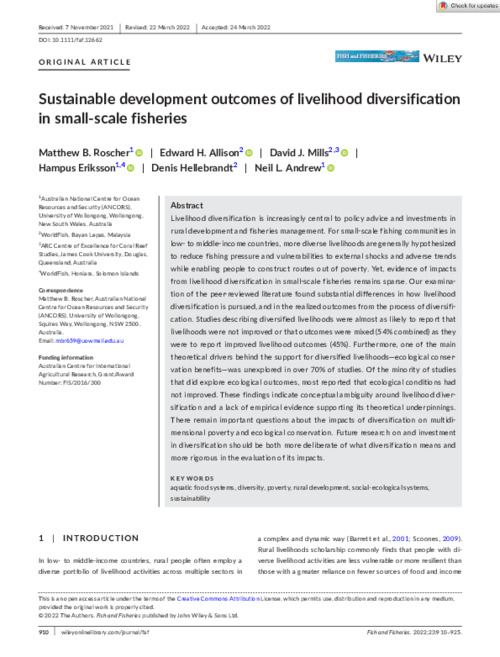Please use this identifier to cite or link to this item:
https://hdl.handle.net/20.500.12348/5253
Sustainable development outcomes of livelihood diversification in small-scale fisheries
| dc.creator | Roscher, M.B. | en_US |
| dc.creator | Allison, E. | en_US |
| dc.creator | Mills, D.J. | en_US |
| dc.creator | Eriksson, H. | en_US |
| dc.creator | Hellebrandt, D. | en_US |
| dc.creator | Andrew, N.L. | en_US |
| dc.date.accessioned | 2022-10-06T17:06:59Z | |
| dc.date.available | 2022-10-06T17:06:59Z | |
| dc.date.issued | 2022 | en_US |
| dc.identifier.citation | Matthew Roscher, Edward (Eddie) Allison, David Mills, Hampus Eriksson, Denis Hellebrandt, Neil Andrew. (1/7/2022). Sustainable development outcomes of livelihood diversification in small-scale fisheries. Fish and Fisheries, 23 (4), pp. 910-925. | en_US |
| dc.identifier.issn | 1467-2960 | en_US |
| dc.identifier.issn | 1467-2979 | en_US |
| dc.identifier.uri | https://hdl.handle.net/20.500.12348/5253 | |
| dc.description.abstract | Livelihood diversification is increasingly central to policy advice and investments in rural development and fisheries management. For small-scale fishing communities in low- to middle-income countries, more diverse livelihoods are generally hypothesized to reduce fishing pressure and vulnerabilities to external shocks and adverse trends while enabling people to construct routes out of poverty. Yet, evidence of impacts from livelihood diversification in small-scale fisheries remains sparse. Our examination of the peer-reviewed literature found substantial differences in how livelihood diversification is pursued, and in the realized outcomes from the process of diversification. Studies describing diversified livelihoods were almost as likely to report that livelihoods were not improved or that outcomes were mixed (54% combined) as they were to report improved livelihood outcomes (45%). Furthermore, one of the main theoretical drivers behind the support for diversified livelihoods—ecological conservation benefits—was unexplored in over 70% of studies. Of the minority of studies that did explore ecological outcomes, most reported that ecological conditions had not improved. These findings indicate conceptual ambiguity around livelihood diversification and a lack of empirical evidence supporting its theoretical underpinnings. There remain important questions about the impacts of diversification on multidimensional poverty and ecological conservation. Future research on and investment in diversification should be both more deliberate of what diversification means and more rigorous in the evaluation of its impacts. | en_US |
| dc.format | en_US | |
| dc.language | en | en_US |
| dc.publisher | Wiley (12 months) | en_US |
| dc.rights | CC-BY-4.0 | en_US |
| dc.source | Fish and Fisheries;23,(2022) Pagination 910-925 | en_US |
| dc.subject | diversity | en_US |
| dc.subject | social-ecological systems | en_US |
| dc.title | Sustainable development outcomes of livelihood diversification in small-scale fisheries | en_US |
| dc.type | Journal Article | en_US |
| cg.contributor.funder | Australian Center for International Agricultural Research | en_US |
| cg.contributor.funder | CGIAR Research Program on Fish Agri-Food Systems | en_US |
| cg.contributor.funder | University of Wollongong | en_US |
| cg.subject.agrovoc | poverty | en_US |
| cg.subject.agrovoc | sustainability | en_US |
| cg.subject.agrovoc | rural development | en_US |
| cg.subject.agrovoc | Fish | en_US |
| cg.contributor.affiliation | WorldFish | en_US |
| cg.contributor.affiliation | University of Wollongong | en_US |
| cg.contributor.affiliation | James Cook University, ARC Centre of Excellence for Coral Reef Studies | en_US |
| cg.identifier.status | Open access | en_US |
| cg.identifier.ISIindexed | ISI indexed | en_US |
| cg.contribution.worldfishauthor | Allison, E. | en_US |
| cg.contribution.worldfishauthor | Mills, D.J. | en_US |
| cg.contribution.worldfishauthor | Eriksson, H. | en_US |
| cg.contribution.worldfishauthor | Hellebrandt, D. | en_US |
| cg.description.theme | Resilient small-scale fisheries | en_US |
| dc.identifier.doi | https://dx.doi.org/10.1111/faf.12662 | en_US |
| cg.creator.id | Matthew B Roscher: 0000-0002-3408-8763 | en_US |
| cg.creator.id | David Jonathan Mills: 0000-0003-0181-843X | en_US |
| cg.creator.id | Hampus Eriksson: 0000-0003-1199-6889 | en_US |
